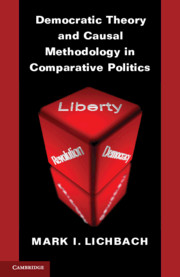Preface
Published online by Cambridge University Press: 05 May 2013
Summary
Barrington Moore bequeathed to comparativists a problem: reconcile his causal claim of “no bourgeoisie, no democracy” with his normative “dream of a free and rational society.” Most comparativists nowadays solve the problem by assuming it away. Believing that causal methodology and democratic theory are independent ingredients in inquiry, causal methodologists discuss comparative statics, constructivism, structural capacity, and mechanisms, while democratic theorists hold a separate debate about procedural, discursive, class-coalitional, and contentious democracy. Against the idea of two compartmentalized reading lists, this book argues that theory and method hold an elective affinity. The Moore Curve – the more external the causal methodology, the thinner the democratic theory – governs democratization studies.
To make its contrarian case, the book adopts a particular style of presentation. A dialogue among four specific texts allows the authors to speak in their own voices and yet represent general paradigms of politics. The analysis opens by comparing an exemplar of rational choice theory, Daron Acemoglu and James A. Robinson’s Economic Origins of Dictatorship and Democracy, with an exemplar of constructivist theory, Lisa Wedeen’s Peripheral Visions: Publics, Power, and Performance in Yemen. Commencing from Moore’s causal claim of “no bourgeoisie, no democracy,” Acemoglu and Robinson couple procedural democracy with comparative statics. Their thin democracy embraces internal choice subject to external constraints. Taking off from Moore’s normative “dream of a free and rational society,” Wedeen pairs discursive democracy with social constructivism. Her thick democracy endorses a release from external bondage to the environment. Perhaps a free and rational society requires a fit state that navigates between a thin democracy determined exogenously and a thick democracy fashioning its own future.
- Type
- Chapter
- Information
- Publisher: Cambridge University PressPrint publication year: 2013



